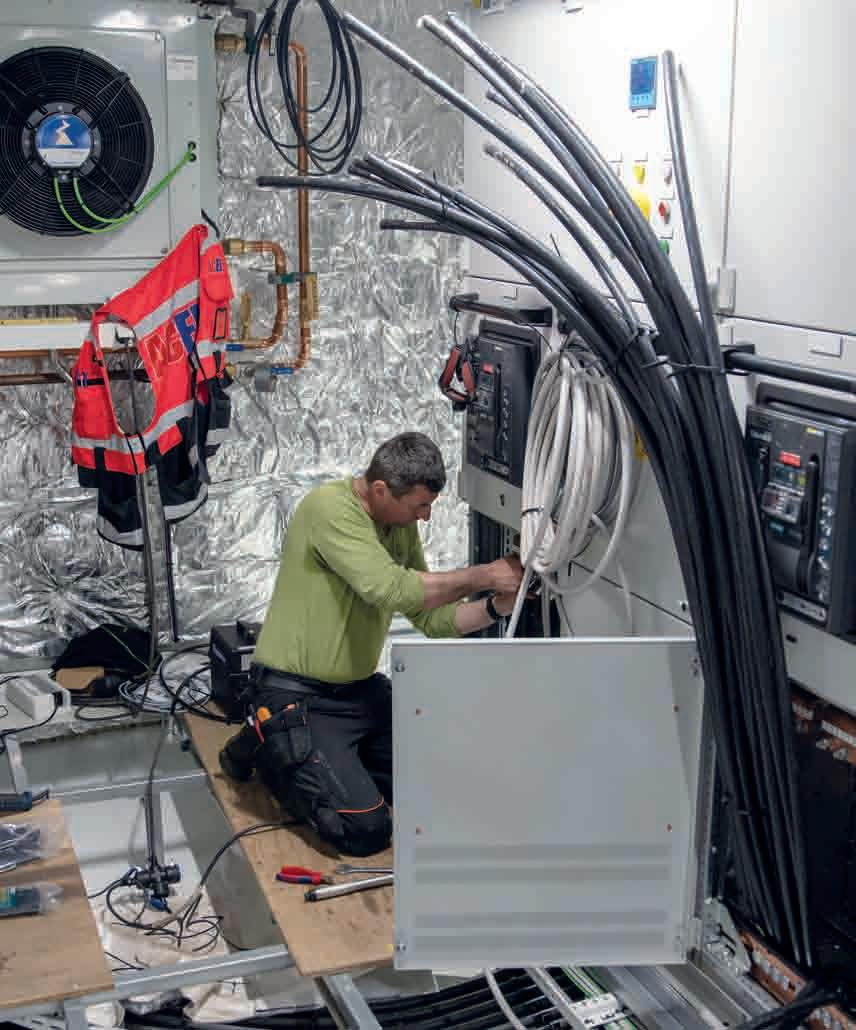
4 minute read
Amokabel presents ALU Ship Connect System
Due to the narrow and confined spaces, it is not easy pulling cables inside a vessel. ALU cables can reduce installation times by at least 40%.
ALU Ship Connect System
Advertisement
A NEW ALTERNATIVE TO COPPER ELECTRICAL CABLES IS OFFERING SHIPOWNERS MORE FLEXIBILITY AND A POTENTIAL WEIGHT REDUCTION OF 55% PER AMPERE.
ALL PHOTOS COURTESY OF AMOKABEL.
In the race towards more environmentallyfriendly shipping solutions, reducing a vessel’s weight is a good way to achieve that goal. Swedish cable manufacturing company Amokabel has developed the ALU Ship Connect System, aluminium power cables that offer vessel owners and operators significant benefits. “Until now, it wasn’t common to use aluminium cables aboard vessels”, comments Amokabel Norway CEO Hermod Iversen. “The main reason for not using the aluminium cable before is that the IEC standards for shipboard cables only accepted copper cables. After contacting DNV GL, it was agreed that alternative technical solutions, in this case aluminium cables, might be accepted onboard, provided equivalent technical safety was documented by thorough testing.” Testing and qualification of the ALU Ship Connect system was completed in May 2018 and DNV GL subsequently issued the first type approvals for aluminium cables and connectors on vessels.
Significant savings Amokabel manufactures various kinds of wires, cables, and consumer-packaged products. The company has a strong focus on quality and minimal environmental impact, and these values are the foundation of the new system. “The main reason we started looking into the possibilities with aluminium was the environmental aspect. Copper is much heavier and with the new types of vessels, the hybrid or high-speed vessels, any weight reduction option is worth looking into”, explains Mr Iversen.
“Compared to copper cables, you need more or bigger aluminium cables to get the same electrical load but even taking that into account, you can save up to 55% in weight per ampere by using aluminium cables. That is a big reduction and one that can make a significant impact on the fuel consumption of a vessel. Especially when you measure it over a vessel’s lifetime.” This weight reduction is particularly attractive for the new type of environmentally-friendly vessels being built, Mr Iversen explains. “When you have a heavy containership, the weight savings are going to make a difference but it will be comparatively small. However, on a batterypowered vessel or a high-speed ferry, the weight reduction is going to have an enormous impact. Every kilo counts on electric vessels.”
Additional benefits It is not just the weight reduction that will have a positive impact on the environment. Aluminium is also a more environmentallyfriendly solution, states Mr Iversen. “The production of the cables is completely green, adding to the environmental benefits of using our aluminium cable systems. Moreover, the cost of aluminium cables is significantly lower than copper cabling, because the material costs are much lower. Copper is a semi-precious metal. It is not cheap, and it seems a waste to just hide it on the bottom of a ship for thirty years. Especially if there is a cheaper, lighter, and cleaner alternative available.”
Successful installation Amokabel has spent years developing the project, researching, carrying out tests, and getting certified with, and by, DNV GL. The ALU Ship Connect System consists of aluminium cables and copper terminations from Mecatraction in France. “The whole system has been approved by DNV GL. The crimping technology (DBI) has been specially developed by Mecatraction and we worked very closely together to find the best solution for a reliable connection. The crimping technology is based on the combined experience from the aircraft and automotive industry.” In 2015, Amokabel successfully installed the ALU Ship Connect System on an offshore service vessel in Norway. Another benefit of the aluminium cables became evident during installation. “Because the aluminium cables are so much lighter, they are easier to install”, details Mr Iversen. “It is not easy pulling cables inside a vessel due to the
The aluminium power cables of the ALU Ship Connect System are much lighter and easier to install than traditional copper cables.

narrow and confined spaces in which they are often placed. I have received several positive comments from installers saying that our ALU cables make their job a lot easier. I would estimate that our cables can reduce installation times by at least 40%.” Amokabel and DNV GL in March 2018 carried out a joint inspection on board the offshore vessel and found the cables were working perfectly. “There was no change in behaviour or rise in temperature in the cables”, comments Mr Iversen. Successful testing, both in laboratory and on board, showed equivalent safety levels compared with traditional copper cables. This enabled DNV GL to issue the first type approvals for
aluminium shipboard cables and terminations in 2018.” He concludes, “Our biggest challenge now is convincing ship owners and operators of the benefits of the ALU Ship Connect System. Rome wasn’t built in a day, or even a year. But we believe in our product and we believe others will too.”

